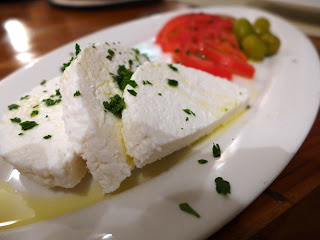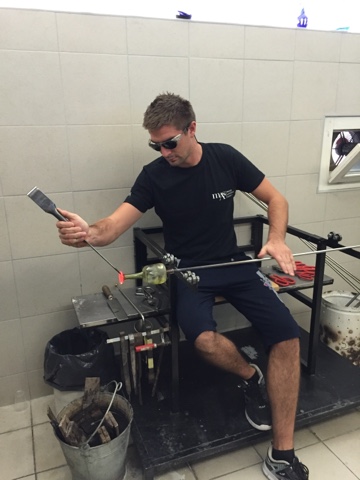As we traveled around Croatia, we soon realized that the Croatian cuisine is a melting pot.
The coastal cities being a major trading port, has easy access to spices like cinnamon and nutmeg to play around to whip up new recipes. There is a Konoba around every corner of the street, serving fresh seafood like mackerel, mullet, scampi and octopus.
The Venetians has taught the locals how to make the best pasta. It is interesting to see the split (no pun intended), that Coastal regions has more Mediterranean influence using olive oil, rosemary, sage and oregano, whereas mainland cuisine uses lard for cooking instead.
The Stari Grad plain has maintained the Greek chora agricultural system for over 2000 years, raising olives and grapes, and the Greeks have passed down the secret of wine-making.
While we were having lunch at Konoba Matejuska, we met a Dalmatian grandpa who invited himself to sit down to tell us more about the history of Croatia. "When you ask a Croatian, what kind of fish should we have, the answer is not what kind of fish, but always: fresh fish!"
It was a real treat for me because being a fish lover, I had very easy access to fresh fish daily (Although to be honest they are comparatively more expensive than meat). I've had grilled milkfish, to seabass with tomato spaghetti, to grilled tuna dressed with lemon and garlic sauce.
 |
| Grilled Milk Fish and Mullet, Scampi |
 |
| Fish Stew |
 |
| Fresh salad |
 |
| Black Squid Risotto |
"You see, the vegetation on the island Pag is covered with sea salt dust, this is what gives it a unique taste to the cheese, because when the lamb drinks its mother's milk, the milk is already salted from the grass they eat", the Dalmatian grandpa explained as he guzzled down his wine.
 |
| Island Pag Cheese with olive and tomatoes |
It is a delightful event of fish stew, tomato salad with Pag cheese and grilled fish and scampi.
"I can guarantee you, we have the cleanest and most fresh fish here, because the fish market here are built on top of a Sulfur spring, and flies hate the smell of it. So you will never find a fly around here!" Our grandpa laughed and gave us a wink.
As we move towards the North, there are more meat-oriented dishes. The Turkish and the Austro-Hungarian occupations have given a new option of Goulash, Pasticada and various kind of sarma (minced meat rolled in cabbages), and spitted lambs with black pepper, garlic, and paprika. Meat is considered as a special treat, particularly popular among weddings. Around the Lika area (close to Plitvice Park), it is covered with forests so deer steak and venison stew are also rather common."I can guarantee you, we have the cleanest and most fresh fish here, because the fish market here are built on top of a Sulfur spring, and flies hate the smell of it. So you will never find a fly around here!" Our grandpa laughed and gave us a wink.
 |
| Stewed lamb with green peas |
 |
| Roasted lamb leg with potatoes |
 |
| Venison Pasta |
The sauce of these stews are often rich with herbs and what better ways to pair with red wines from region of Primosten?
"The best grapes grow on the most rugged and rocky, terraces. When the sun shines directly on the rocky mountains, the grapes grow the best. Just like people don't you think?"
It turned out our wonderfully informative grandpa is a Croatian diplomat, and has hosted ambassadors from all over the world, sharing some of the greatest stories of all times.
"There is an old phrase in Croatia: if you drink water you will get frogs in your stomach, but if you drink wine, you are a socialite."
So we toasted to another round of drinks and laughter and fijaka* from too much drinking and eating.
fijaka*- a deliciously lazy mood of utter contentment



















































![[US] Newport Mansions, Gilded Age and Vanderbilts (2) [US] Newport Mansions, Gilded Age and Vanderbilts (2)](https://blogger.googleusercontent.com/img/b/R29vZ2xl/AVvXsEgdLVBJVfOugvhyj0sFWVPv5Wk3XKrRK_Te_9cDQteObCZvGZWvOYiMcFLbacpGN6JNjkwiVhiEFWnUtyjnUp4yRjnZkUaMx3Qa90D0DcjaYgSmgaS-WQxM1LNOIP0MqQgvEiB7cJHQT1tW/s72-c/IMG_5365.jpg)

![[US] Newport Mansions, Gilded Age and Vanderbilts (1) [US] Newport Mansions, Gilded Age and Vanderbilts (1)](https://blogger.googleusercontent.com/img/b/R29vZ2xl/AVvXsEg38cwMN4jNE72LXybmV93WwFLD25QUgFLfdCO88c1Lnfa-Xp55epQFPXnHWLVP6cdnxUD7sr98_5LDW2s0BBF0N53y81gq4sYF1hOp3bv3We2QlQ9X4LvWn2cE1MhRGzexHpsM-FeWUJOa/s72-c/IMG_5349.jpg)
![[Michelin Restaurant 1*]: Esszimmer [Michelin Restaurant 1*]: Esszimmer](https://blogger.googleusercontent.com/img/b/R29vZ2xl/AVvXsEjx3TfFMYFpukgSZ1DPSMyILiJv8cUZw_371lGNHPMqlUccutFF-ThHaUEug_8rrAkHxnRMkH7e8VxJ2AXhBnCAdmpbtTnFEcKVefCeE_yIVhAzAsdAcvIEHMlgJm8ZD5375tFH6WSMIxwI/s72-c/IMG_5508.JPG)








